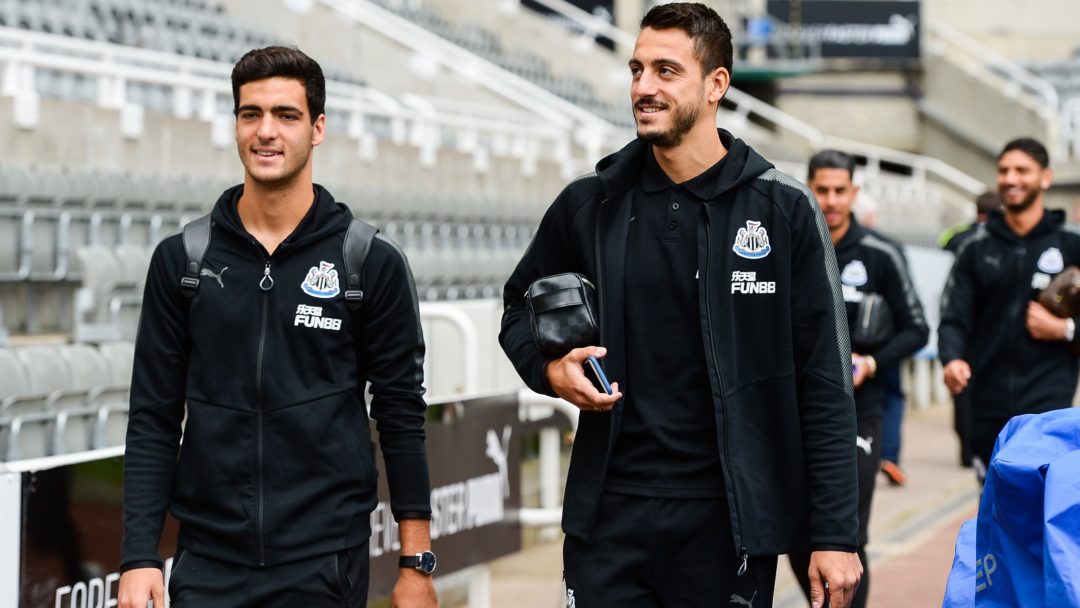It has become very apparent that the Spanish lads who arrived in the summer have adapted incredibly quickly to Rafa’s tactics and the frenetic pace of the Premier League. Whilst Manquillo and Joselu had experience in England prior to joining NUFC neither of them pulled up any trees and their respective arrivals were greeted without much enthusiasm and indeed with piss taking by some fans of their previous clubs. However, many of us have been surprised at just how comfortable they’ve looked on the ball and I don’t think any of us had a clue just how good Mikel Merino is. TF has a good friend in Miguel Molina who is not only a coach at Atl’tico de Madrid’s famous academy but also played his youth football at the club. TF picked his brains on how their youth systems work in the hope that it might give us a little insight in to just why Spanish footballers, in general, have adapted so well to the English game over the last decade.
NR: Here in England there has always seemed to be an emphasis on playing lots of football and developing youngsters physically. I take it this isn’t the case in Spain?
MM: From my experiences as a coach at Atl’tico de Madrid and from conversations with coaches at other academies (Villareal, Celta de Vigo, Real Madrid, Barcelona, Ajax, Bayern Munich, PSG, Schalke etc), I have arrived at the conclusion that the most important thing we do is develop an understanding of the footballer as a human being, how he relates with others in different contexts. From there we can then channel his behaviour to adapt to different situations. Our role as coaches, fitness coaches, assistants is to construct a methodological system of training that integrates and organises these characteristics with the aim of assimilating them to the team collective. By doing this the player takes on what we’re aiming to implement in a natural manner.
At the methodological level the process is guided by the tactical dimensions of the Club’s model of play. By developing an understanding of this the rest (physical, technical, psychological, socio-affective development) will follow. It is essential to have a deep knowledge of the game and, from there, to be aware of how training can optimize the acquisition of individual and collective behaviors within our unique system. Ultimately the objective is to create an organization that understands the functionality of the playing system in its different scales of interaction, from the individual to the collective. It is from this organization, and the consequent reduction of uncertainty, that creative variability and individual talent emerges.
NR: Do you think the Spanish system is as ruthless as the English one? For example, we have a load of youth players who at the age of 18 or on the eve of when they should be turning professional are thrown on the scrapheap. In Spain is the emphasis on developing fewer but higher quality players?
MM: I think that in this sense both systems are similar. The youngsters in the academies of the top flight clubs in Spain are part of a selection process very similar to the one in England. Having said that, I believe that in Spain, the recruitment process is much more systemised so that each club selects players who seem to fit within the parameters of their culture, philosophy and game ideology. I think that clubs in Spain take on a player not just with an eye on the here and now success of the youth team but on what they might be capable of further down the line whereas in England the club places a high emphasis on how well the youth team is doing in the present. This leads us to reflect on the priorities at the formative level within a country, whether to develop the short-term performance of the youth teams of the different academies, or to promote a macro-structure of development, valuing the player’s long-term development as the ultimate goal of process. However, I think that England is in a period of transition, framed within a macro-structural approach of the development of the player, that not only adheres to the goals of the FA, but also integrates into and directs the methodology of the English club sides, as has happened in Germany. I’m certain these changes will begin to pay off in a short time, as has already been evidenced with the U20s national team.
NR: All of our Spanish players here at Newcastle appear really comfortable with the ball at their feet. If all English players had this level of ease when on the ball it would likely add millions to their value. Is being comfortable on the ball something that is drilled in to players in their youth?
MM: It seems that the whole world identifies Spanish football with this trait. I don’t think that our players have a talent that differentiates them from English players but what I believe is that they are taught to read the game and from this they are able to find an endless number of options when on the ball. The technical development that is so characteristic of the modern Spanish player has to be instilled early on in the formative process. We have to take into account the on-going technological development and’ sociocultural evolution of football and leave aside the so-called street football element but we also must take into account the latter as a potential context for nurturing the development of the cognitive, sociological and emotive aspects of a player’s talent, as well as the natural creativity and autonomous management of their own learning process.
NR: It’s obvious that many Spaniards who now play in England are able to adapt to it with relative ease. Why do you think this is? The lads at Newcastle at present look like they’ve been playing here for years. Merino, for example, looks like a veteran after 2 games.
MM: It’s a consequence of everything we’ve previously spoken about. The methodological framework that directs the training process and the knowledge and understanding of the decision-making process by the technical staff are fundamental in designing and developing tasks that systematically optimize a player’s natural talents. We attempt to instill in a player the ability to adapt and re-configure his decision-making process to changing contexts. In this sense how we guide the design of training tasks and our interventions during training become central to the process. It is our responsibility as technicians to know how to identify the critical points of fluctuation in a player’s performance and at the point of change in a game modify his behavior in order for him to adapt to this change.
NR: In my opinion Spanish players at the top level seem to behave in a more down-to-earth manner than the English players who have been at the top level all their lives. Are players kept from developing an arrogance or ego as youngsters. Do you focus as much on their life off the pitch as on it?
MM: I don’t agree with that sentiment. I believe there’s a bit of both in Spain and England. I can’t say with certainty what the general mentality of an English footballer is but I’m certain, both from having played and coached in Spain, what the Spanish mentality is. For us the comprehensive education of the player is something that is done at all Spanish clubs. Education, respect, humility, empathy, ability to reflect, assertiveness, self-control, teamwork. All of these are fundamental qualities for anyone and the footballer should not be a stranger to them in his life as part of society. We prepare players for the professional field but, above all, our responsibility as teachers is to educate people so that they can integrate and improve a society in which we all have a stake.
Huge thanks to Miguel Molina for this @Miguel_Molina10
Norman Riley





great insight here, and this confirms to me we need changes at NUFC academy. unfortunately SAFC are a lot closer to this kind of model than us at the minute
Thanks Graham – appreciate your reply.
Very interesting, thanks Norman.
Thanks Colin – very much appreciated.